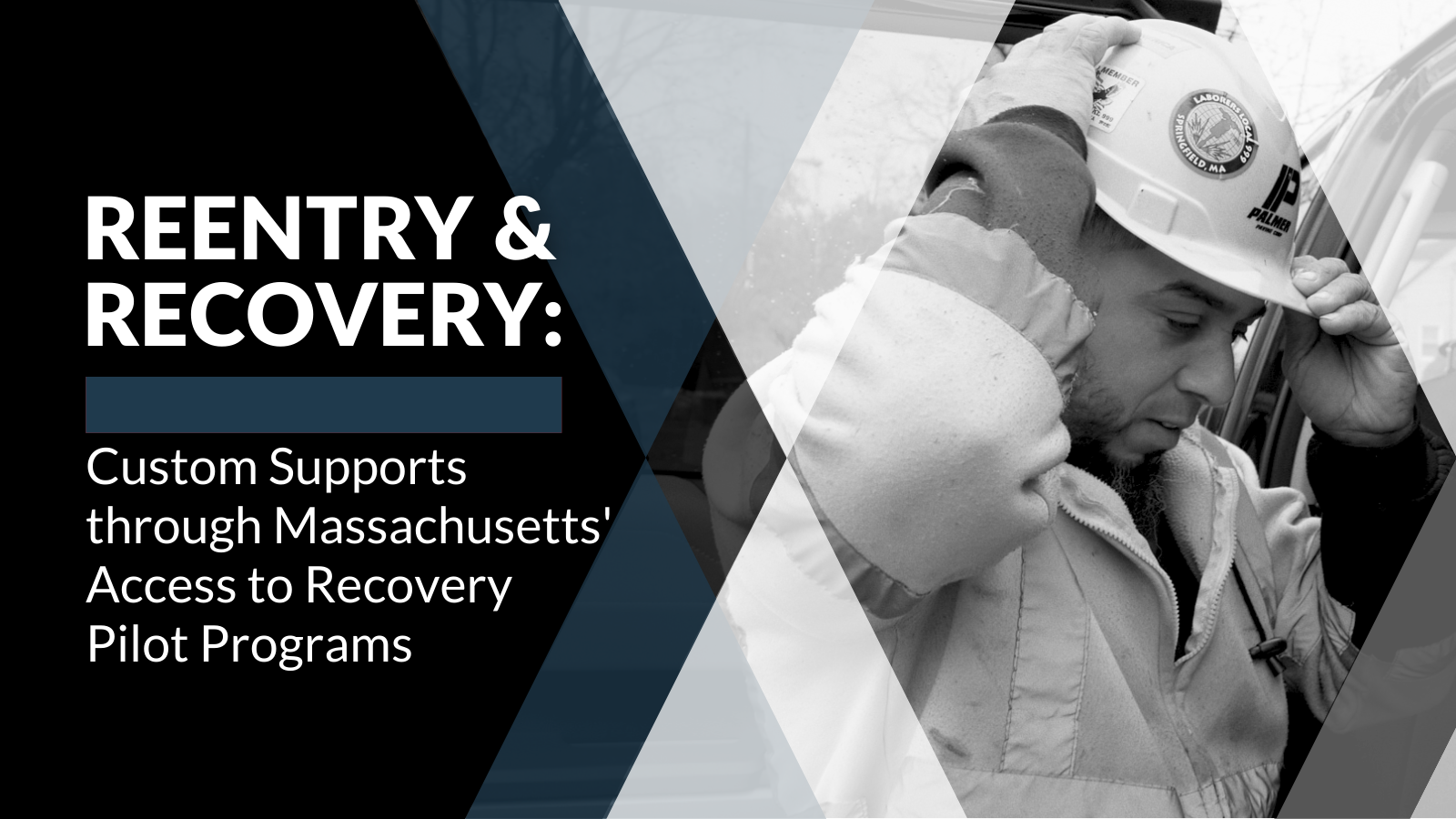For more than 10 years, the Massachusetts Access to Recovery (ATR) program has been helping people with substance use disorders (SUD) improve their lives through individualized recovery support services across the spectrum of needs, including housing, recovery coaching, and job training. While not exclusively for individuals involved with the justice system, more than 70 percent of ATR participants are reentering the community or have histories of criminal justice involvement.
ATR is a 6-month program open to people who are in the early stages of recovery (the first 3 months to 2 years) from SUD. The program links participants with a coordinator who helps them with various recovery needs. Individuals are referred to ATR by community providers, such as recovery homes/long-term residential treatment programs, providers of medication for opioid use disorder, outpatient treatment providers, behavioral health providers, community health centers, and other recovery organizations. ATR is funded by a grant from SAMHSA and the Massachusetts Bureau of Substance Addiction Services (BSAS).
ATR coordinators work with participants to build customized recovery plans in three domains: basic needs, employment, and recovery.
- Basic needs: ATR funds many of the basic day-to-day needs of individuals who are working to regain their lives after incarceration and in the early stages of their recovery from SUD. These basic needs may include transportation (such as a bus pass, bike, or cost of registering or insuring a personal vehicle), basic hygiene and self-care products, clothing, unpaid bills, identification (e.g., state ID, driver’s license, birth certificate, or passport), children’s needs, or any other cost that creates a barrier to recovery. The participant chooses how best to use the funds available to them.
- Employment: ATR provides job readiness support and training to help individuals grow or gain skills to help them obtain and maintain employment. ATR partners with MassHire, Massachusetts’s network of one-stop career centers, and many local job training programs to help people get work-ready and find careers. “ATR career services is built on the foundation that when people in recovery are employed, they experience positive life outcomes,” says Kelly Joseph, MS, deputy director of the ATR “From the time participants are enrolled in the program, they are encouraged to begin exploring their employment interests and options.”
- Recovery: All ATR participants can engage with a peer recovery coach who provides support and guidance as they navigate their early recovery. “Recovery coaches inspire hope by sharing their own experiences and help individuals move forward in living self-guided and fulfilling lives,” says Brita Loftus, MPH, MSW, LCSW, director of ATR.
ATR Pilot Programs Offer Focused Support
In the past couple of years, ATR launched two new pilot programs focused on specific populations and services, all funded by state entities based on identified needs.
Enhanced Care Coordination Program Supports Reentry for Black and Latino Men
Last year, ATR partnered with BSAS on a pilot program aimed at serving Black and Latino men experiencing SUD who were reentering the community after incarceration. BSAS funded the project after research showed that services frequently did not reach this population, and Black and Latino men were dying of overdose at a much higher rate than White men. In order to address this, individuals referred by a community-based organization who are in the early stages of their recovery are automatically invited to participate in the program if they identify as Black or Latino.
While traditional ATR engages individuals after reentry, the Recovery Based Reentry Services for Black and Latino Men program does in-reach in carceral settings before an individual is released. Once released, participants continue to work with their case managers, and ATR then provides them with additional “enhanced” care coordination that involves more frequent contact and recovery-oriented services and supports.
ATR+ Focuses on Pathway to Employment
ATR is also working on a pilot project with the Massachusetts Department of Correction and Massachusetts Probation Service called Access to Recovery Plus, or ATR+, which supports successful reentry for individuals released from carceral settings. “This program really hones in on employment as the goal,” Joseph says. “They still have to meet the criteria of early recovery from SUD, but we concentrate on setting goals around getting a job.” This is being accomplished through three primary activities:
- Building digital literacy skills, which can be especially important among individuals who have been incarcerated for a long time or those who have never been employed
- Job readiness and job preparedness using the Paths to Empowerment (P2E) Program through MassHire (U.S. Department of Labor’s American Job Centers in Massachusetts), which includes skill and confidence building
- Occupational job training offered through short-term skills training with local partners in a variety of careers, including carpentry, HVAC, medical administration, culinary arts, truck driving, and more
“At this point in the pilot, we’ve seen really strong—100 percent—completion rates in steps 1 and 2,” Joseph says. “We’re excited to see our participants move into step 3 and start their careers.”
ATR’s Impact
While the pilot programs are still gathering initial data, the flagship ATR program has shown powerful outcomes among individuals served.[1] After 6 months of program engagement, 98 percent of participants have maintained their recovery, and 99 percent have no new arrests or interactions with the criminal justice system. After 6 months in ATR, 55 percent of participants have secured employment, and 28 percent have secured stable housing (defined as renting or owning their own house, apartment, or room).
[1] These data include only those participants who had interpretable responses at both enrollment and disenrollment. A total of 3,964 participants self-reported at enrollment and disenrollment.
Like what you’ve read? Sign up to receive the monthly GAINS eNews!


